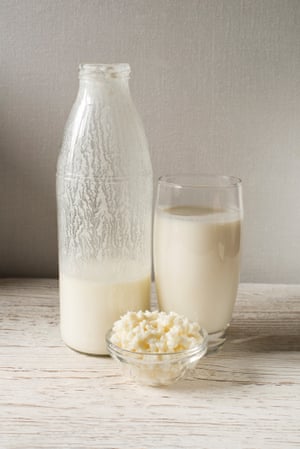Do kimchi and other fermented foods give you more fizz? | Life and style
When something makes it into the everyday story of country folk that is The Archers, it’s safe to say that it has gone mainstream. So, hearing Tom Archer’s plans for a kefir empire was all the proof I needed that, as he said: “Fermented foods are the future!†As ever, where Gwyneth Paltrow leads, Ambridge follows.
The health and wellness brigade have been fizzing over ferments for almost a decade; indeed, way back in 2011, Lindsay Lohan was said to have blamed a positive alcohol test while on probation on her fondness for kombucha, a fermented-tea drink. More pertinently, perhaps, Australian journalist and bestselling sugar-avoider Sarah Wilson urges anyone “with auto-immune issues, irritable bowel syndrome, bloating, sugar cravings or any kind of digestive or allergy issue†to give fermenting a go. The Hemsley sisters have called sauerkraut “our ultimate condiment for healthâ€, while chef Gizzi Erskine loves kimchi â€" a punchy Korean speciality generally made from cabbage, chilli and garlic â€" so much that she named her cat after it. Not bad for what is, essentially, just some elderly cabbage.
What it does
As with so many fads, fermentation is nothing new. Humans have been harnessing the natural action of microorganisms to preserve food for thousands of years. In fact, as “fermentation revivalist†and pickle evangelist Sandor Katz put it on a recent edition of Radio 4’s Food Programme: “Humans did not invent or create fermentation. It would be more accurate to state that fermentation created us.â€
In simple terms, fermentation involves the use of micro-organisms to transform food from one state to another â€" sort of like cooking, but without the application of heat. In the right conditions, bacteria and yeasts will start to convert the natural sugars in foods into other compounds, such as alcohol or lactic acid. This not only inhibits the growth of other potentially more harmful bacteria, but also changes the flavour of the food concerned â€" the distinctive tang of yoghurt, for example, is produced by microbes feeding on the lactose in milk. It also, helpfully, slows the spoiling process.
Beer and wine are fermented foods, as are bread, sauerkraut, olives, cured meats, chocolate, coffee, miso, many cheeses and various kinds of pickles â€" “all the really good stuff,†as food writer Michael Pollan puts it. So, the good news is that you are probably eating a few already. They exist in what Katz describes as the “creative space between fresh and rotten food, where most of human culture’s most prized delicacies and culinary achievements existâ€.
But, although interesting flavours are a handy side-effect, it is the microbial content that has got health types excited â€" because bacteria are big news these days. More specifically, the 39tn microbes, weighing about as much as your brain, that live happily in your gut, the makeup of which, some evidence suggests, may have a significant effect on everything from your long-term weight to your current mood.

How it helps us
Unfortunately, the typical modern western menu does little to nourish this “huge alien ecosystemâ€, as Dr Michael Moseley puts it, under siege as it is from antibiotics and a deluge of cleaning products designed to sterilise every part of our existence. However much we may like junk food and chemical additives, our gut bacteria does not â€" and our increasingly narrow diet has led to a similar lack of diversity in our gut. Tim Spector, professor of genetic epidemiology at King’s College London and the author of The Diet Myth, explains that if we “wipe out our gut microbes, then our immune system goes into autodrive and starts attacking us with autoimmune diseases and allergiesâ€.
One way of boosting your natural gut flora is to eat more of the kind of foods they thrive on â€" which, according to the British Dietetic Association, include onions, garlic, asparagus, artichoke, chicory and banana. These prebiotics, as they are known, will encourage microbe growth. The other way, which is what concerns us here, is the use of so-called probiotics, foods or supplements containing beneficial bacteria that, if they make it as far as our guts, will take up residence there. Fermented foods, or at least live fermented foods (beware pasteurised pickles, for example), are generally considered to be an excellent source of these desirable microbes.
NHS Choices reckons there is good evidence probiotics can prevent children on antibiotics developing diarrhoea; and some evidence that they can shorten an episode caused by a stomach bug by up to a day; they may help relieve the symptoms of irritable bowel syndrome and lactose intolerance, too. Nevertheless, “the current state of the evidence does not demonstrate that probiotics have any effect on gut bacteria in healthy peopleâ€. However, they go on to concede that: “Given the limitations of these studies, that is not to say that all probiotics definitely have no effect. Further high-quality research in their use is needed.â€
Katz, who firmly rejects media suggestions that he has managed to cure his Aids with fermented foods, takes a similarly low-key attitude. “In general, when I hear people talk about fermented foods as a cure for particular diseases â€" you know, eat sauerkraut to cure cancer, drink kombucha to cure diabetes â€" that’s kind of a trigger for me,†he told Radio 4. “I just think it is not reasonable to expect eating a particular food is going to cure a particular disease … these foods can be very, very powerful and healing, they can potentially improve digestion and nutrient assimilation, immune function and mental health and more. Those are benefits that we all can enjoy and that’s not the same as curing any particular disease â€" their place is in the context of a rich and very varied diet.â€

Fortunately, as microbes seem to be the current buzz topic within the scientific community, more such research is likely to be forthcoming: Spector has already been instrumental in the establishment of British Gut, the UK’s largest open-source science project, which is investigating the microbial diversity of the human gut, running in tandem with a similar project in the US. For about £350, you get an expert interpretation of your microbiome â€" and scientists get the benefit of your data.
What to eat
In the meantime, there is certainly no harm in including fermented foods in your diet. Not only does it seem likely that the more varied your intake the better, but also they are easy to digest, as some of the work has already been done for you, and they tend to have a distinctive, complex and (sometimes) challenging flavour.
Live yoghurt is good, but kefir, a fermented milk drink that originated in the Caucasus, is better â€" according to Spector, it contains at least five times as many microbial varieties. Kombucha is another decent source, as are raw milk cheeses, sauerkraut, pickles or kimchi. Natto, Japanese fermented soya beans, may be an acquired taste, but nutty Indonesian tempeh is just like tofu, but nicer. Just make sure none of it has been heat-treated to increase its shelf life.
In the long term, however, you might be better off preparing your own. Like many other ferments, kimchi is surprisingly easy to make at home with little more than a sturdy jar and a bit of patience. Mosley’s recent findings in an episode of BBC2’s Trust Me, I’m a Doctor suggest that homemade ferments often contain a more diverse range of microbes than their shop-bought equivalents; some of the commercial products he looked at contained barely any. And, of course, doing it yourself means you can expand your range beyond cabbage, which may well be welcome after a few weeks of fragrant kimchi â€" I would recommend kefir as a foolproof place to start.
We are only just beginning to understand the influence of the trillions of tiny hitchhikers inside each of us, so the true importance, or otherwise, of live foods to our diets may be a while in coming. As Spector puts it: “We’re still in the dark ages as to how these amazing things work, but we know they do.†And, well, if it’s good enough for Tom Archer ...

0 Response to "Do kimchi and other fermented foods give you more fizz? | Life and style"
Posting Komentar